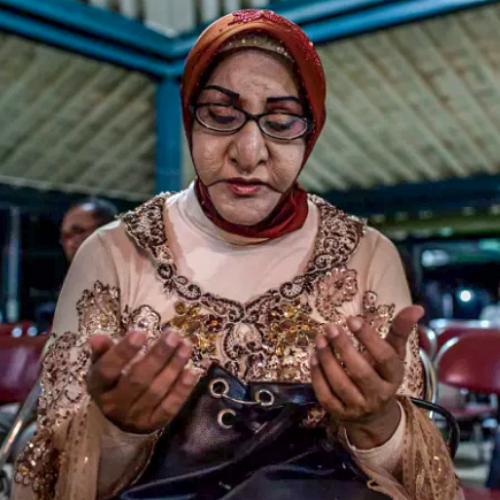“We study Islam, and pray together, and share our lives,” Shinta says. “We do not choose to be transgender people, this is given by God.”
The Yogyakarta community is used to the school, which runs community activities such as the free haircuts. “They accept us,” Shinta said.
But the show of visibility came at the end of a difficult year in which Al Fatah was forced to close its doors from February to June after threats from the Islamic Jihadist Front.
Starting in January 2016, a series of derogatory comments from government officials unleashed an unprecedented wave of violence and hate against LGBT Indonesians.
Violent acts were committed with impunity; demonstrations were shut down by Islamic fundamentalists; and LGBT organisations were forced to moved premises out of fear.
“We don’t have time to breathe,” an Indonesian activist said.
Shinta and Al Fatah were casualties.
“At that moment, all of Indonesian society had hate issues with LGBT people,” she said.
Now, the furore has subsided and the daily attacks in the media halted. The national attention has been averted elsewhere. But there are lingering ramifications.
“Life is more difficult for LGBT people,” one Indonesian man, who lives in Jakarta and asked only to be identified as TI, notes.
“Many LGBT people are living in constant fear, thinking of what could happen next. For many others, this is the reason why they should conceal their identity.”
The government’s silence in the face of attacks, or even its participation in them, lent legitimacy to anti-LGBT sentiment sweeping the country, TI said.
“[LGBT people] saw the state, instead of protecting their rights, become sources of hate and discrimination through statements made by public officials.”
In January, the Research, Technology, and Higher Education Minister, Muhammad Nasir, said LGBT groups should be barred from university campuses: “There are
standards of values and morals to uphold. A university is a moral safeguard.”
He later backtracked on social media, but the comments had already spread, and other senior officials chimed in.
Social Affairs Minister Khofifah Indar Parawansa said LGBT groups were “converting” poor middle school kids; Defense Minister Ryamizard Ryacudu used the analogy of war to say LGBT people were a threat; and the Administrative and Bureaucratic Reform Minister Yuddy Chrisnandi said it was “inappropriate” for civil servants to be gay: “Having more than one wife for a man is still normal…but LGBT is another issue.”
“It opened the eyes of more LGBT people that they are living in a homophobic society and it has become worse,” TI said.
Dede Oetomo, the founder of Indonesia’s first LGBT rights group Gaya Nusantara, told Alturi that LGBT activism in Indonesia was largely underground.
“Last year at this time, every day, there was an attack, a verbal attack from this politician or this cleric, and that has actually calmed down,” he said.
“But for activists, when we organise an event, it has to be clandestine. Usually what people do is they announce there is going to be a film screening or this or that, but the venue is not mentioned.
“There’s usually a WhatsApp number or something that people can check, and people are screened. Of course it means that fewer people know about these things.”
Event screening is not new for LGBT Indonesians, but it has now become standard practice. Venue bookings are another source of worry – LGBT groups try not to give their names to hotels and function rooms.
In Aceh, where same-sex intimacy is criminalised and punishable by 100 public lashings, the situation is even worse.

